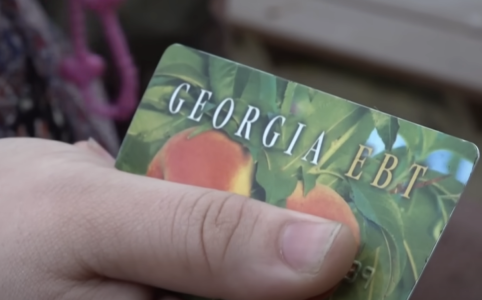When grocery trips raise warning signs: What SNAP recipients should know
By
Veronica E.
- Replies 0
For millions of families, SNAP benefits are a lifeline that helps put food on the table each month.
These benefits cover the basics—bread, vegetables, meat, and milk—and for many households, they are the difference between having enough and going without.
But a recent case in Kentucky shows how easily a routine grocery run can spiral into something more serious.
One mom suddenly found herself accused of fraud and stripped of her benefits, even though she was only buying everyday meals for herself and her kids.
Her experience raises important questions about how states enforce SNAP rules, and what recipients need to know to protect themselves.

A grocery trip gone wrong
In 2020, a single mother in Kentucky faced an unexpected nightmare.
After years of responsibly using her SNAP benefits, she received a notice accusing her of fraud.
The supposed evidence? Same-day grocery purchases at the store where she worked, repeated PIN entry errors, and transactions made in whole-dollar amounts.
In reality, she wasn’t abusing the program.
She was simply buying small meals and snacks while on shift, sometimes multiple times a day.
Occasionally, her child used the card and mistyped the PIN.
Despite this, her benefits were cut off.
It took a lawsuit and Judge Thomas Wingate in Franklin County to overturn the decision, with the judge calling the state’s actions “draconian.”
Also read: What to know about this month’s SNAP benefit changes
The bigger picture: SNAP under scrutiny
This case is not unique.
Across the country, states have stepped up efforts to flag possible fraud by analyzing transaction patterns.
Kentucky has been especially aggressive, ranking second only to Florida in per capita administrative disqualifications.
The numbers tell the story: Kentucky went from fewer than 100 disqualifications in 2015 to more than 1,800 in 2023.
Many cases are based on algorithms that treat multiple purchases in a day or odd transaction amounts as suspicious.
But as this mom’s story shows, daily life doesn’t always match what the data suggests.
Also read: SNAP retailers could see changes as USDA proposes new stocking standards
What SNAP is—and who relies on it
The Supplemental Nutrition Assistance Program supports over 41 million Americans each month.
Benefits are distributed through Electronic Benefit Transfer (EBT) cards and can be used for most grocery essentials.
Items such as alcohol, tobacco, hot prepared foods, and non-food products are off-limits.
For low-income families, SNAP can be the key to maintaining a stable food supply.
Losing benefits, even temporarily, can create devastating hardship, especially for parents and children.
Also read: SNAP rules are changing in 12 states—here’s what foods could soon be off-limits
The human cost of strict enforcement
Since 2022, more than 900 Kentuckians have been disqualified from SNAP for “trafficking” or other misuse involving amounts under $1,000—sometimes for transactions worth just a few cents.
The process often begins with a letter asking recipients to waive their right to a hearing and accept a ban along with repayment.
Legal experts, including University of Kentucky law professor Cory Dodds, have questioned whether the state is meeting the burden of proof.
Dodds noted, “I’m not saying that folks didn’t do it, didn’t commit the fraud, but I don’t think the cabinet in a lot of these cases has met their burden of proof, either.”
Concerns became so widespread that a judge ordered the state to stop cutting people off based only on transaction data.
Still, lawsuits indicate the practice may continue.
Also read: SNAP benefits hit by massive scam surge—are your funds at risk?
What SNAP users can do
While rules vary, there are ways to help protect yourself if you rely on SNAP:
A call for compassion and fairness
SNAP exists to help families, not to punish them.
While protecting the program from fraud is important, overzealous enforcement risks harming the very people it was designed to support.
Stories like this Kentucky mother’s are a reminder that real lives are at stake when benefits are cut off without clear proof.
Read next:

Have you or someone close to you ever faced a SNAP dispute or unexpected loss of benefits? Do you think the system is fair, or does it need to change? What advice would you give to others navigating the process?
Share your experiences in the comments—your voice may help others protect themselves and their families.
These benefits cover the basics—bread, vegetables, meat, and milk—and for many households, they are the difference between having enough and going without.
But a recent case in Kentucky shows how easily a routine grocery run can spiral into something more serious.
One mom suddenly found herself accused of fraud and stripped of her benefits, even though she was only buying everyday meals for herself and her kids.
Her experience raises important questions about how states enforce SNAP rules, and what recipients need to know to protect themselves.

SNAP provides food assistance to more than 41 million Americans each month. Image Source: YouTube / 11Alive.
A grocery trip gone wrong
In 2020, a single mother in Kentucky faced an unexpected nightmare.
After years of responsibly using her SNAP benefits, she received a notice accusing her of fraud.
The supposed evidence? Same-day grocery purchases at the store where she worked, repeated PIN entry errors, and transactions made in whole-dollar amounts.
In reality, she wasn’t abusing the program.
She was simply buying small meals and snacks while on shift, sometimes multiple times a day.
Occasionally, her child used the card and mistyped the PIN.
Despite this, her benefits were cut off.
It took a lawsuit and Judge Thomas Wingate in Franklin County to overturn the decision, with the judge calling the state’s actions “draconian.”
Also read: What to know about this month’s SNAP benefit changes
The bigger picture: SNAP under scrutiny
This case is not unique.
Across the country, states have stepped up efforts to flag possible fraud by analyzing transaction patterns.
Kentucky has been especially aggressive, ranking second only to Florida in per capita administrative disqualifications.
The numbers tell the story: Kentucky went from fewer than 100 disqualifications in 2015 to more than 1,800 in 2023.
Many cases are based on algorithms that treat multiple purchases in a day or odd transaction amounts as suspicious.
But as this mom’s story shows, daily life doesn’t always match what the data suggests.
Also read: SNAP retailers could see changes as USDA proposes new stocking standards
What SNAP is—and who relies on it
The Supplemental Nutrition Assistance Program supports over 41 million Americans each month.
Benefits are distributed through Electronic Benefit Transfer (EBT) cards and can be used for most grocery essentials.
Items such as alcohol, tobacco, hot prepared foods, and non-food products are off-limits.
For low-income families, SNAP can be the key to maintaining a stable food supply.
Losing benefits, even temporarily, can create devastating hardship, especially for parents and children.
Also read: SNAP rules are changing in 12 states—here’s what foods could soon be off-limits
The human cost of strict enforcement
Since 2022, more than 900 Kentuckians have been disqualified from SNAP for “trafficking” or other misuse involving amounts under $1,000—sometimes for transactions worth just a few cents.
The process often begins with a letter asking recipients to waive their right to a hearing and accept a ban along with repayment.
Legal experts, including University of Kentucky law professor Cory Dodds, have questioned whether the state is meeting the burden of proof.
Dodds noted, “I’m not saying that folks didn’t do it, didn’t commit the fraud, but I don’t think the cabinet in a lot of these cases has met their burden of proof, either.”
Concerns became so widespread that a judge ordered the state to stop cutting people off based only on transaction data.
Still, lawsuits indicate the practice may continue.
Also read: SNAP benefits hit by massive scam surge—are your funds at risk?
What SNAP users can do
While rules vary, there are ways to help protect yourself if you rely on SNAP:
- Keep receipts and notes: If you make multiple small purchases or share the card with a family member, track your use.
- Watch for notices: If you receive a letter about your benefits, respond quickly and seek legal advice before signing anything.
- Know your rights: You are entitled to a hearing before losing benefits—don’t waive that right without understanding the impact.
- Stay informed: Rules evolve. For example, restrictions on certain snack foods have recently been added, so check program updates regularly.
A call for compassion and fairness
SNAP exists to help families, not to punish them.
While protecting the program from fraud is important, overzealous enforcement risks harming the very people it was designed to support.
Stories like this Kentucky mother’s are a reminder that real lives are at stake when benefits are cut off without clear proof.
Read next:
- This woman was left with “nothing in the fridge” after a $500,000 scam–Don’t be next.
- This mom lost her $1,500 SNAP benefits—protect your groceries now!
- The FBI just revealed two words that signal you're being scammed—find out now!
Key Takeaways
- A Kentucky mother lost her SNAP benefits after being accused of fraud based on transaction data but later won her case in court.
- Kentucky ranks among the top states for SNAP disqualifications, with cases often triggered by automated systems rather than solid evidence.
- Experts have raised concerns that many families are being penalized for normal spending patterns or small mistakes.
- SNAP remains a crucial lifeline for more than 41 million Americans, making the consequences of unfair enforcement especially severe.
Have you or someone close to you ever faced a SNAP dispute or unexpected loss of benefits? Do you think the system is fair, or does it need to change? What advice would you give to others navigating the process?
Share your experiences in the comments—your voice may help others protect themselves and their families.






